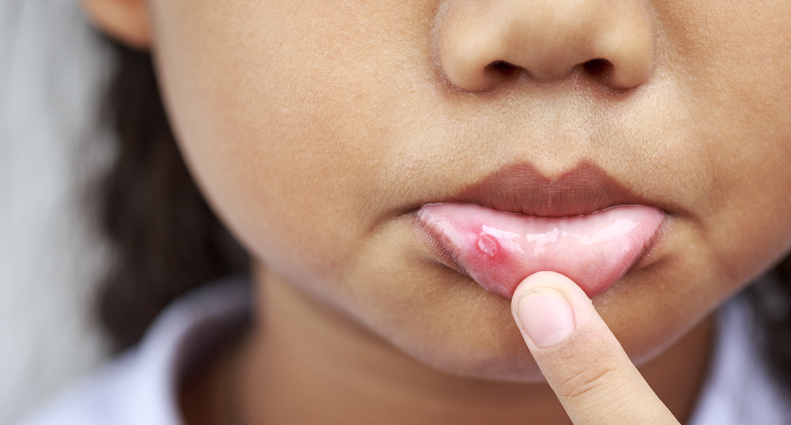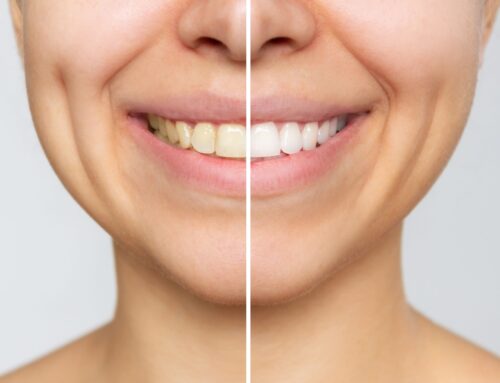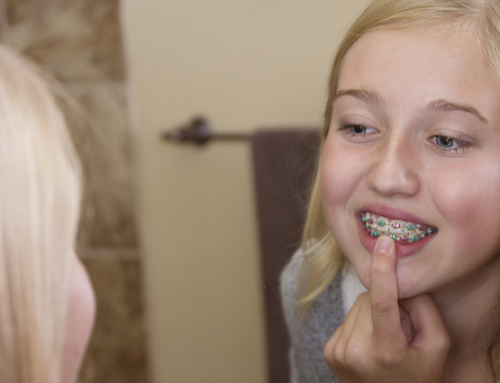
What Are Canker Sores
Can you believe that 1 in 5 people regularly develop canker sores?! Ouch. Canker sores are white, yellow, or grey irritations found around the tongue and inside of the cheeks. Not to be confused with cold sores, these red-rimmed craters are commonly found in children over 10 years old and primarily in women. Moms, listen up!
Canker sores are not contagious, and even though they are rarely found in your baby’s or toddler’s mouth, they can cause a great deal of discomfort. If your child is in pain while eating or drinking, they may have a canker sore lurking in their mouth. These sores can occur in any mouth, but you can find some fast solutions here!
Why Do Canker Sores Happen?
Canker sores have a tendency to run in families, so some people are just more prone to developing them. Otherwise, we don’t have an exact answer for why canker sores come around, but we do know a few things that may help their arrival.
- Emotional stress
- Irritation from sour or spicy foods
- Injury to the mouth’s lining
-
- Brushing
- Biting
- Hot liquids
- Rough foods (e.g., chips)
- Braces or other dental appliances
- Food allergies
- Certain vitamin deficiencies
Getting Rid Of Canker Sores
Even though canker sores are not usually dangerous, they certainly shouldn’t be ignored. Many times, they last under two weeks and can go away on their own, but why not help prevent discomfort from the start? Here are some great places to begin:
- Over-the-counter pain relief (e.g., ibuprofen or acetaminophen) may be all that you or your child needs to ease the sore.
- If your child is old enough, have them wash their mouth out a few times per day with warm saltwater.
- Also, try making a paste out of baking soda and water to be applied directly to the sore following meals. This can soothe some of the aches.
- They should absolutely avoid eating abrasive and irritating foods such as spicy food, sour candies, and salty chips. After all, it is an open sore in your child’s mouth.
- In addition, be gentle during oral care routines. This includes checking the ingredients in the toothpaste to ensure no SLS, which is thought to be an irritant to canker sores.
Frequently Occurring Sores
Does your child develop canker sores often? They may need to be tested for food allergies or certain vitamin deficiencies. Frequent canker sores can sometimes signal an underlying health condition, such as celiac disease, inflammatory bowel disease, or, in rare cases, even immune system issues. Also, if a sore does not heal within a couple of weeks, contact your pediatric dentist. They may prescribe your child a topical ointment or medicinal mouthwash.
Further, these sores should not be accompanied by side effects other than being a nuisance to the mouth. If a fever or further swelling occurs, visit your child’s doctor.
Questions to Ask Your Child’s Healthcare Provider
When your little one is dealing with pesky canker sores, it’s always a good idea to come prepared for your visit to the doctor or dentist. After all, being proactive helps ensure your child gets the best care and you walk away with some peace of mind (and maybe a few less worries). Here are some helpful questions you might want to bring up during your appointment:
- What might be causing my child’s canker sores, and is there anything in their diet or habits that could be changed to prevent them?
- Are there foods or ingredients we should avoid while my child’s mouth is healing?
- Are over-the-counter treatments like Orajel or baking soda rinses safe for children, and do you recommend using them?
- How long should a canker sore typically last before we become concerned?
- What symptoms mean I should call you or schedule a return visit (for example, fever, worsening pain, or additional sores)?
- Could my child have any allergies or vitamin deficiencies contributing to frequent sores, and do you recommend any specific tests?
- If topical ointments or mouthwashes are suggested, how and when should we use them?
- Are there any side effects with the medications or treatments prescribed?
- What can we do at home beyond medication to help my child feel comfortable while they heal?
Remember, no question is too big or too small when it comes to your child’s health. Bringing a list (yes, on your phone is fine!) keeps you organized and ensures nothing gets left out when you’re chatting with your provider.
How Do Dentists Diagnose Canker Sores in Children?
Spotting a canker sore is usually pretty straightforward for a dentist or pediatrician—a quick look and your child’s health history is often enough. But in some cases, when the sores are stubborn or keep coming back, the doctor might want to dig a little deeper (don’t worry, we promise, nothing scary).
Here’s how they might investigate further:
- Blood work may be ordered to check for possible vitamin deficiencies or underlying health issues.
- Swabbing the sore could be done to rule out any infections that might look similar.
- Tissue sample (biopsy)—rarely, the dentist might need a tiny tissue sample to look under a microscope, just to be extra sure it’s a canker sore and not something else.
Most of the time, though, it’s as simple as an exam and a few questions.
Further, these sores should not be accompanied by side effects other than being a nuisance to the mouth. If a fever or further swelling occurs, visit your child’s doctor.
See a Dentist for Canker Sore Treatment
At Snodgrass-King Dental Associates, we want you to feel well informed about what can and does happen to you and your children’s mouths. Knowing the difference between a canker sore and a cold sore will help you to better treat the issue. If you are uncertain about why your child’s mouth is hurting or looks a certain way, please request an appointment with us! Regular checkups can ensure that you and your family have happier, healthier smiles.





